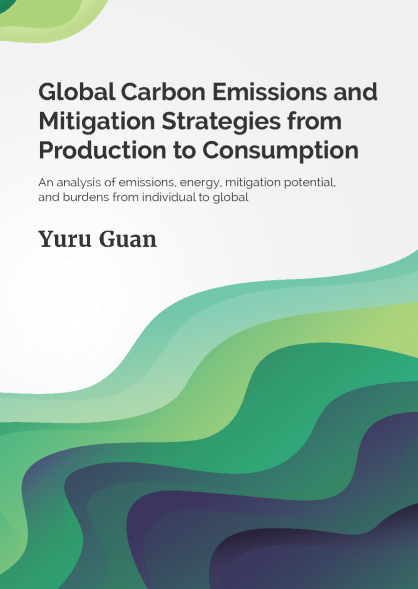PhD defense: Global carbon emissions and mitigation strategies from production to consumption | Mw. Y. (Yuru) Guan, MSc
| When: | Tu 25-03-2025 16:15 - 17:15 |
| Where: | Academy building |
|
PhD ceremony:
| |
|
When:
|
March 25, 2025
|
|
Start:
|
16.15 p.m.
|
|
Supervisor:
| |
|
Co-supervisors:
| |
|
Where:
| |
|
Faculty:
|
Science and Engineering
|
|
Research Institute:
|
Summary
As global greenhouse gas emissions continue to rise, an integrated approach is crucial for effective mitigation. In her thesis, Yuru Guan examines carbon emissions and mitigation pathways from both production and consumption perspectives, addressing key challenges in emissions accounting, the role of household consumption, and the impact of energy crises on household energy burdens.
Guan focuses on production-based emissions, using China as a case study. Accurate carbon accounting is essential for effective mitigation, particularly in high-emitting, fast-developing economies. China’s emission growth, driven by industrialization and coal dependency, highlights the need for region-specific strategies and harmonized energy data.
Guan also studies consumption-based emissions, analyzing household carbon footprints across global countries. Household consumption patterns and lifestyle choices are major emission drivers. Targeting high-emission households through low-carbon lifestyle changes offers significant mitigation potential, though rebound effects—where income savings lead to increased emissions elsewhere—pose challenges. Effective policies must balance emissions reductions with social equity.
Guan furthermore examines crisis-driven energy price shocks, such as those following the Russia-Ukraine conflict, which disproportionately burden low-income households. While short-term relief measures like subsidies address energy poverty, they must align with long-term sustainability goals.
Finally, Guan examines integrated production- and consumption-based perspectives, emphasizing that effective carbon mitigation requires coordinated efforts—like rowing with both oars. This thesis enhances carbon accounting, deepens understanding of consumption-driven emissions, and informs policies for a just and sustainable low-carbon transition.
Dissertation: https://hdl.handle.net/(...)aa-8380-3cf71aeed874

